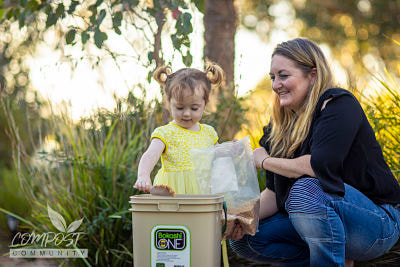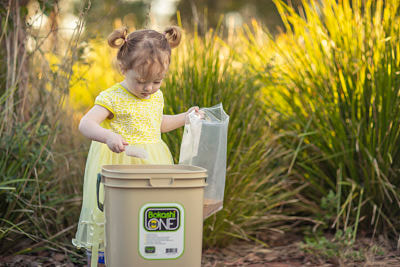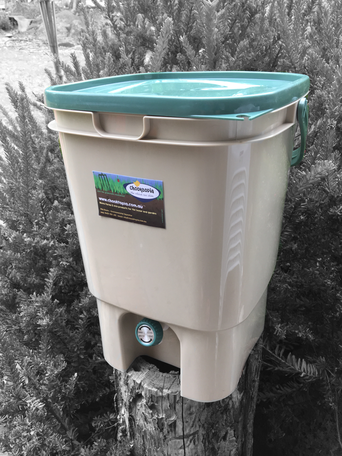BokashiA game changer for composting and soil repair.
What is Bokashi?The magic of bokashi lays in the 80 essential microbes first isolated by agricultral researcher Dr. Teruo Higa in the 1970s and benefits from the ceramic powder in the resin bucket.
Bokashi is an enclosed system (pictured right) within which you ferment your food waste with a unique blend of 'bokashi' microbes before burying it in the soil or tipping it into the compost. Incredibly fast, with just two weeks spent pre-composting (fermenting) your food waste in the bucket, and within two weeks of burying your fermented matter, you can plant straight into it, for the healthiest soil and best fruit and vegetable crop you have ever experienced. Bokashi repairs soilJust like we benefit from the probiotics in fermented foods for gut health, especially after antibiotics, soil ecology also benefits from the restoration of soil probiotics in bokashi. These probiotics:
Bokashi is childs playBokashi is so, so easy, even our toddler has mastered it.
Each time you empty it, just give it a quick rinse, and start again! |
Not all bokashi is created equalBe wary of cheap (and not so cheap) imitations. Many systems on the market are not air tight and have no ceramic powder in the resin, so are just overpriced buckets. Avoid off the shelf sprays Bokashi liquid and sprays have a very limited shelf life (of around 2 weeks), so by the time you buy them are ineffective and your food will rot and smell rather than ferment. Buy a liquid that is fermented fresh from a seller you know and trust, and feed the microbes fortnightly with molasses. Bokashi flakes/powder/grain have a shelf life of up to 3 years if prepared correctly as the . Some brands are more potent than others. Don't kill your microbes Keep your microbes at room temperature and out of direct sunlight. If you are using a liquid, open the lid weekly to release the build up of gasses. |
What makes Bokashi so good?
|
Bokashi has some key benefits what explain why it is growing in popularity:
|
Does Bokashi smell?When the lid is closed, there should be no smell. As a fermentation system, it should have a hops or apple cider vinegar smell if any. You may have some underlying smells too, for example the one from our office always has a hint of coffee! If it smells feral, something is wrong. Either you haven't added enough bokashi activator, or you have used an ineffective mix, such as an off the shelf spray. |
What's better - bokashi, worm farm or compost?Depending on your waste, and the size of your garden, some systems will suit you better than others.
As bokashi needs to be buried every time you empty the bucket, you need at least the space equivalent to a couple of half wine barrels in order to manage it properly. You are welcome of course to drop your processed bokashi compost to Compost Community. We love adding it to the compost bins to speed them up. Where can I drop my bokashi contents if I have no space at home?We love receiving processed bokashi! You might even have a keen neighbour - find them on Sharewaste.
Many community gardens accept compost and bokashi contents, including Compost Community. Check them out on our Community Gardens page. |















